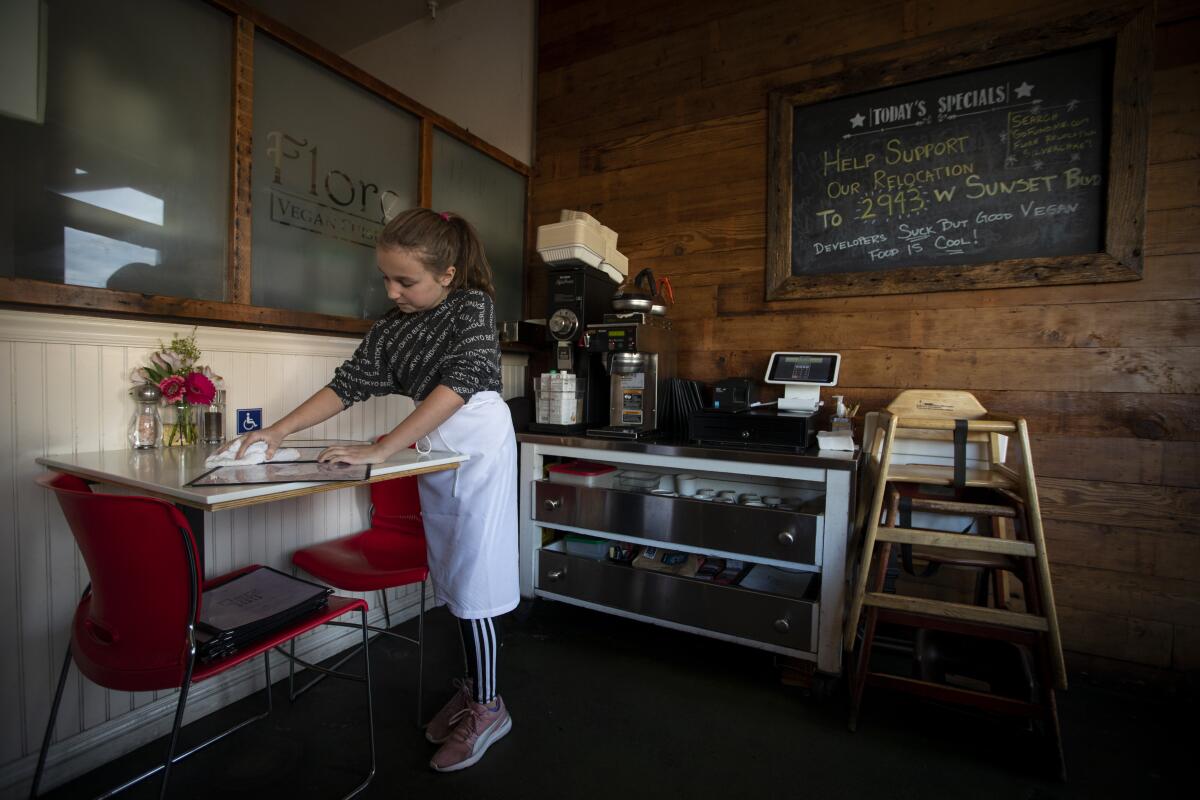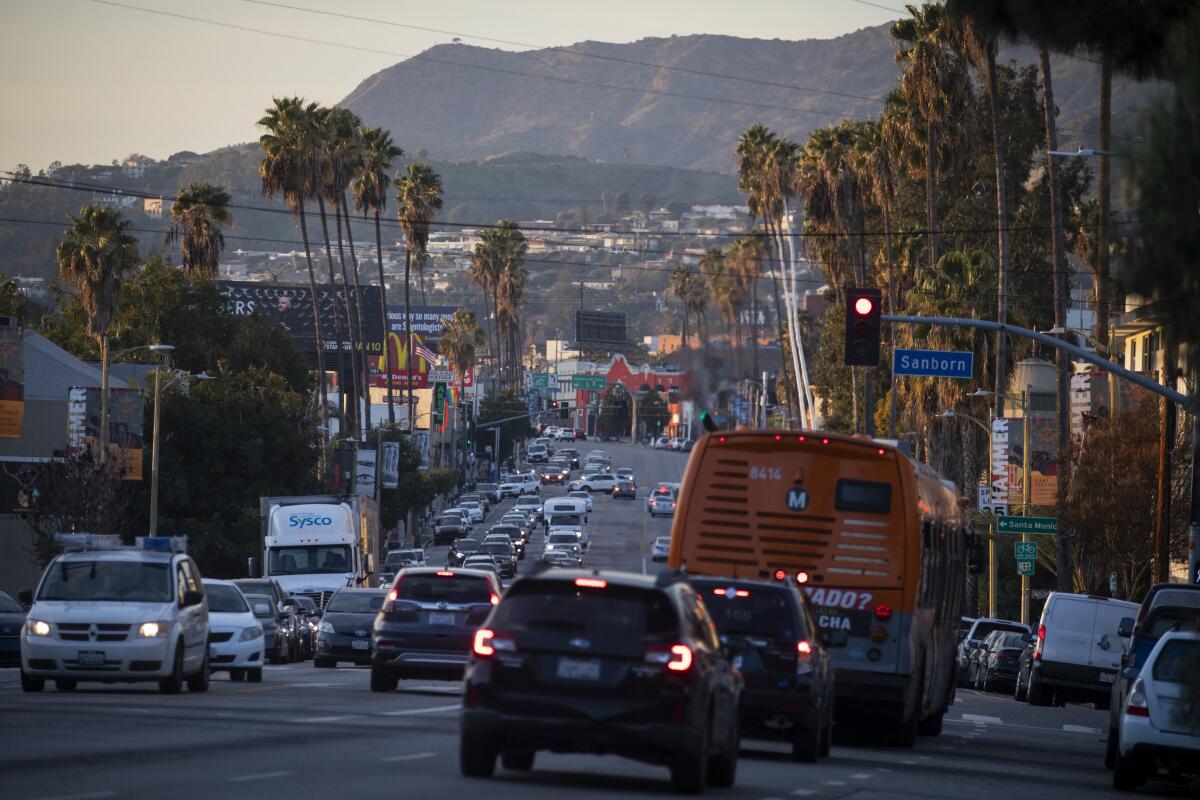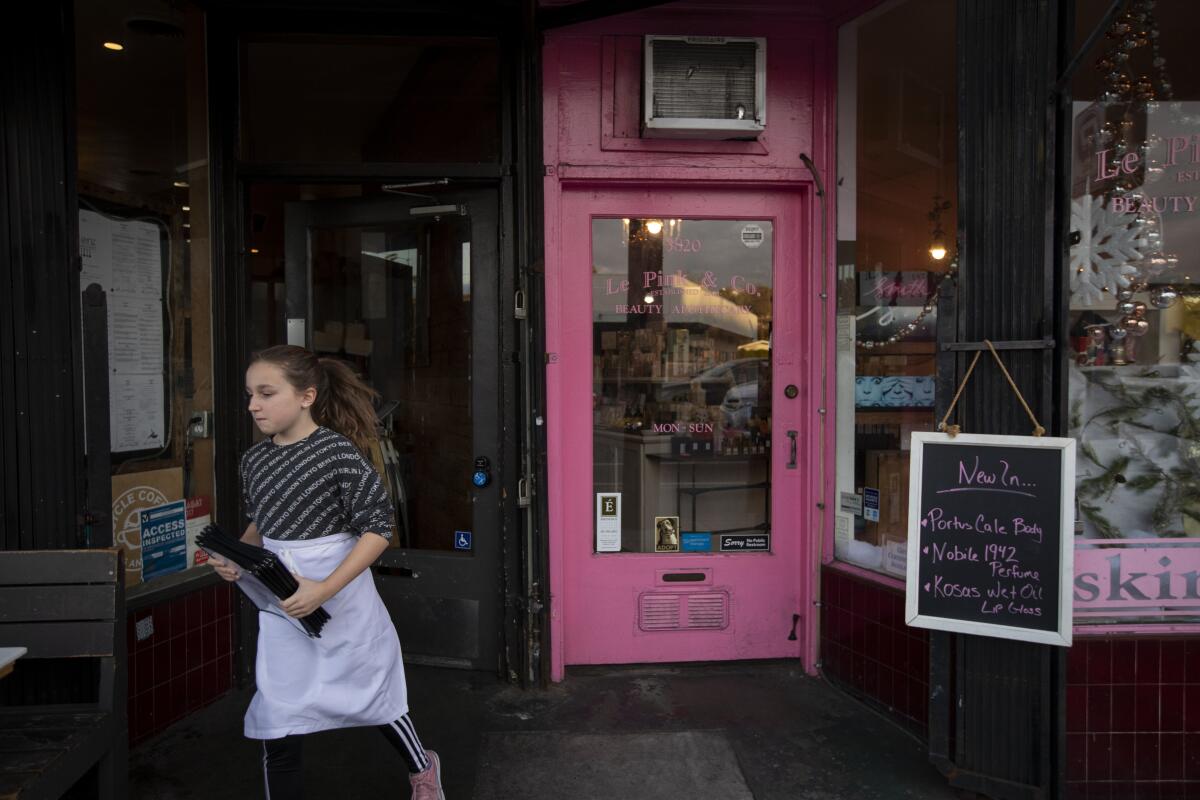In Silver Lake, a vegan joint tells of how the big fish of gentrification eat the little ones

- Share via
Miranda Megill admits that when she opened a vegan restaurant in 2007, it wasn’t without a few pangs of guilt that she may have helped push Silver Lake’s famous gentrification along.
Nonetheless, after 13 years of nurturing her business, Flore Vegan became a part of Los Angeles’ brunch culture in a hipster mecca, bustling from morning to night.
But as businesses like Flore Vegan flourished, Silver Lake became the example of the ultra-gentrified neighborhood that inspired activists to fight back against the forces of change happening throughout Los Angeles, particularly in the Eastside. Protesters took measures to keep newcomers out in places like Boyle Heights, targeting cafes and art galleries that had begun to encroach into the mostly working-class Latino neighborhood.
Still, in an ever-changing Los Angeles, there always loomed someone out there with a bigger dream — and a lot more money. In December, Megill received an eviction notice for her two businesses near Sunset Junction.
Megill learned that a company purchased the building housing Flore Vegan and another business she owned. She looked up the buyer, and on its website, found the developer touted a mission of “gentrifying” communities with “underutilized properties in the hottest neighborhoods of L.A.”
And so what she feared she had been doing to others more than a decade ago was suddenly happening to her.
“It’s like buying a house, getting it exactly how you want it and having someone say ‘Thanks, we’ll have that,’” Megill said.
Since the day Flore Vegan opened, Megill was overwhelmed by its success. She went on to buy the neighboring Le Pink, a beauty apothecary selling decadently wrapped soaps, lotions and skincare products.
Megill divided her time between the two businesses, working as a salesperson some days and a cook on others.
On a recent weekday, Megill worked behind Le Pink’s counter when her 10-year-old daughter, Violet, ran into the shop. She was on winter break and had been waiting tables at Flore Vegan. Grinning, she flashed several bills to her mother — her hard-earned tip.
“I’m so proud of you,” Megill told the girl as Violet ran back to work.
Next door, Flore Vegan is lit by light bulbs enclosed in mason jars hanging from the ceiling. The restaurant is decorated with paintings and ornate vintage mirrors, and its tables are set with jars of fresh flowers. Patrons can sit outside with their dogs to enjoy “chicken” and waffles, tofu scramble and nachos.
It’s a different world from decades ago.
In the 1970s and 1980s, Central American and Mexicans migrated to Los Angeles in large numbers, settling in neighborhoods close to the city, including Silver Lake, according to Luis Nuno, an assistant professor at Cal State L.A. who studies gentrification.
Over the next few decades, suburban youngsters moved to the city with a desire to experience what they perceived was a more exciting urban life, Nuno said. Others came from other parts of the U.S.
Given its proximity to Hollywood, the area became a haven for creatives, writers and actors. Coffee shops, organic food, juice bars — and vegan food — became the markers for a transforming Los Angeles, Nuno said.
Silver Lake was artsy and “bohemian,” said John Bush, who has lived in the neighborhood since 1982. There was plenty of parking, making a trip to Sunset Junction a breeze. And it was cheap back then, with easy public transportation that allowed working-class folks to commute to downtown L.A.
Orbelicia Valle, owner of San Diego Glass & Mirrors on Sunset Boulevard, described Silver Lake in the ’90s as a barrio. Gangs were still present, but she felt safe. There were more Latino businesses and neighbors.
Valle said she was forced to move out of Silver Lake because her rent increased. Now she commutes to work from Koreatown. More and more, she began seeing strangers coming to take photographs of surrounding buildings, looking to buy or sell. Slowly, her fellow Latino business owners were forced out too.
“It’s like they think it’s a gold mine,” Valle said. “That’s not the case. We have to work. It’s not a gold mine.”
She worries about how the changes in the neighborhood are affecting her business. With a new restaurant opening nearby, there’s less parking for her clients. And as prices continue to rise, she’s forced to raise her own prices and negotiate with customers who ask why the prices are so high.
“I love Silver Lake for its people, even though it’s changed,” Valle said. “We started our business here from nothing. It’s our roots. It’s a love for the community, the people. If they come and cut us, it’s like cutting a tree from its roots.”

At the Cafe Tropical and El Cochinito, owner Daniel Navarro had to adapt to his changing clientele. He made less of his grandparents’ authentic Cuban specials and added more vegan and vegetarian food.
The most he can afford in Silver Lake is a one-bedroom apartment.
Navarro he sympathizes with the struggle of people who came after he did.
“If you’re a small-business owner, you know the time, emotion and sacrifice to running a small business, wherever you’re from,” Navarro said.
For his part, he said he tried not to dwell too much on being pushed out.
“It comes down to greed and money at the end of the day,” Navarro said.
Megill said her lease had been up for renewal in June, and she inquired numerous times with her property manager about renewing it.
She was told they were refinancing the building and therefore couldn’t handle her new lease agreement just yet. Repeatedly, Megill said she was told she had nothing to worry about.
But she felt that her property manager and landlord, the owner of the Army-Navy surplus store just a few stores away from her restaurant, was evading her for months. She started seeing new faces, including an Engine Real Estate property manager, showcasing nearby vacant spaces.
One day she arrived in the morning to find someone she didn’t know standing in front of Flore Vegan.
The woman, a representative of Engine Real Estate, handed her a slip of paper: a 30-day eviction notice.
Megill stared with disbelief at the photographs of her own Flore Vegan and Le Pink on the company’s website. The images and “gentrification” language were later taken down.
David Walker, CEO of Engine Real Estate, said in an email that the firm believed Megill was aware of her expired leases and “were already planning to relocate...given that they had not previously extended their leases with prior ownership.”
He said Engine Real Estate agreed to give Megill a 90-day eviction notice instead of 30 days, and two months’ free rent.
“We take our responsibility to the neighborhood very seriously and look forward to introducing businesses that will become a part of the fabric of the Silverlake community for years to come,” Walker said.
Megill, a bubbly, energetic woman, said she could have stayed in bed for weeks mourning the loss of her business. Instead, she forced herself to remain optimistic.
Then she made a tough choice, she said tearfully. She depleted Violet’s college fund to put a down payment on a new restaurant space.
She connected with a restaurant owner of Local, nearby on Sunset Boulevard, who is retiring from the business and offering his space to her. She started a GoFundMe, and asks for donations with a laminated piece of paper slipped into customers’ checkbooks.

As much as it is a neighborhood, with people who work and live and struggle and prosper, Silver Lake is a brand. Shops like Warby Parker and Happy Socks, headquartered in New York and Sweden, have set up there.
“This is what we call a billboard storefront,” said Carol Cetrone, president of the Silver Lake Heritage Trust, a nonprofit that aims to preserve the historical and cultural aspects of Silver Lake and other northeast L.A. communities. “Meaning they just want to be able to put an ad in Los Angeles magazine that they have a storefront in Silver Lake, and it doesn’t matter if they sell one pair of socks a day.”
Cetrone said real estate in the area has become a holding game, “like shares in a stock market.”
Nuno said corporate companies moving in is simply the fruit of capitalism.
“It’s what the gentrifiers did to the working class and Silver Lake, and now we’re seeing people richer than them coming in and doing the same,” he said. “That’s the story of American capitalism. It kind of eats itself.”
The big fish eat the little fish.
Still, compared with the working class that got pushed out, people like Megill were fortunate in that they had more resources to fall back on.
Despite the setbacks, the restaurant space Megill is eyeing has a larger patio space and can seat almost double what her current space does. She expects to move in late February.
Le Pink will be relocated at the end of January and will also be bigger and within eyesight of Flore Vegan’s new location. If business stays good, she has a chance to earn back her daughter’s college fund and help her follow her own dream.
More to Read
Sign up for Essential California
The most important California stories and recommendations in your inbox every morning.
You may occasionally receive promotional content from the Los Angeles Times.














